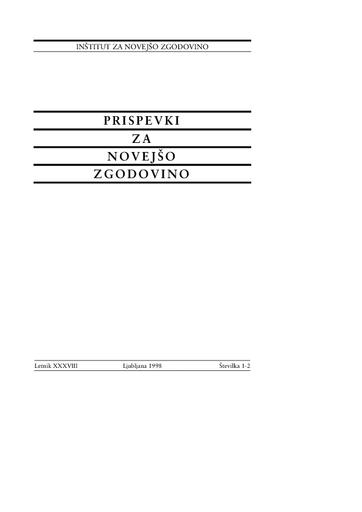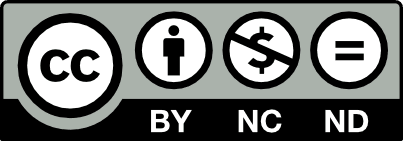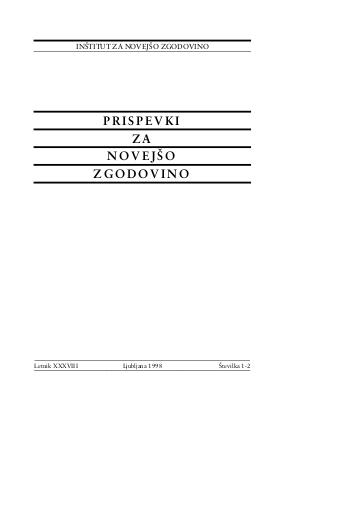
/
Periodicals
/
Prispevki za novejšo zgodovino
Stages of the Revolution during the Pluralist Period in the National Liberation Front

Author(s):Zdenko Čepič
Co-author(s):Jasna Fischer (odg. ur.)
Leto:1998
Publisher(s):Inštitut za novejšo zgodovino, Ljubljana
Language(s):slovenščina
Type(s) of material:text
Rights:

This work by Zdenko Čepič is licensed under Creative Commons Attribution-NonCommercial-NoDerivs 4.0 International
Files (1)

Name:Prispevki_za_novejso_zgodovino_1998_1-2.pdf
Size:2.35MB
Format:application/pdf
Permanent link:https://hdl.handle.net/11686/file219
Description
On the basis of the documents published in the Documents of the People's Revolution in Slovenia series (Dokumenti ljudske revolucije v Sloveniji) the author presents various stages of the revolution which took place during the national liberation war against occupiers in Slovenia and Yugoslavia. He concludes that, during the war, the most obvious manifestations of the revolution were the Communist seizure of political power and the changes in the property ownership. According to him, the first revolutionary stage began with the self-proclamation of the Supreme Plenary of the Liberation Front (LF) as the governing national body. The revolution - which developed in two stages: that of national liberation and that of social class - most clearly manifested its social class aspects in the Spring and Summer of 1942, on the liberated territory in the Ljubljana Province. There, the introduction of political and economic changes under the conditions of the liberation war was often marked by revolutionary terrorism. From Autumn 1942 to Spring 1943, the LF leadership endeavoured to find political means which would transcend the immediate outward appearance of the revolution as that of struggle between social classes. This led to the so-called Dolomiti Declaration (Dolomitska izjava) which gave the Communist Party of Slovenia primacy within the National Liberation Movement and in the execution of its programme of social liberation.
Metadata (12)
- identifierhttps://hdl.handle.net/11686/1945
- title
- Nekaj stopinj revolucije v pluralni dobi Osvobodilne fronte
- Stages of the Revolution during the Pluralist Period in the National Liberation Front
- creator
- Zdenko Čepič
- contributor
- Jasna Fischer (odg. ur.)
- subject
- OF
- revolucija
- Slovenija
- Dolomitska izjava
- description
- On the basis of the documents published in the Documents of the People's Revolution in Slovenia series (Dokumenti ljudske revolucije v Sloveniji) the author presents various stages of the revolution which took place during the national liberation war against occupiers in Slovenia and Yugoslavia. He concludes that, during the war, the most obvious manifestations of the revolution were the Communist seizure of political power and the changes in the property ownership. According to him, the first revolutionary stage began with the self-proclamation of the Supreme Plenary of the Liberation Front (LF) as the governing national body. The revolution - which developed in two stages: that of national liberation and that of social class - most clearly manifested its social class aspects in the Spring and Summer of 1942, on the liberated territory in the Ljubljana Province. There, the introduction of political and economic changes under the conditions of the liberation war was often marked by revolutionary terrorism. From Autumn 1942 to Spring 1943, the LF leadership endeavoured to find political means which would transcend the immediate outward appearance of the revolution as that of struggle between social classes. This led to the so-called Dolomiti Declaration (Dolomitska izjava) which gave the Communist Party of Slovenia primacy within the National Liberation Movement and in the execution of its programme of social liberation.
- Na osnovi dokumentov objavljenih v zbirki Dokumenti ljudske revolucije v Sloveniji in drugih virov predstavlja avtor stopnje v revoluciji, ki se je odvijala v času in pogojih osvobodilne vojne proti okupatorjem v Sloveniji in Jugoslaviji. Ugotavlja, da se je v času vojne kazala revolucija zlasti kot zamenjava oblasti, pa tudi na področju spreminjanja lastninskih odnosov. Kot prvo stopnjo postavlja oklicanje Vrhovnega plenuma OF, političnega organa slovenskega narodnoosvobodilnega gibanja, za oblastni, državni organ. Revolucija, ki se je razvijala v dveh 'fazah', narodni, osvobodilni in v socialni, razredni, je izraz razrednega pokazala najbolj v času osvobojenega ozemlja spomladi in poleti 1942 na območju t.i. Ljubljanske pokrajine. Takrat je spreminjanje političnih in ekonomskih odnosov v pogojih osvobodilne vojne dobilo večkrat izraz revolucionarnega terorja. Od jeseni 1942 do spomladi 1943 se je v slovenskem NOG odvijal proces iskanja političnih sredstev, ki bi presegle neposredni razredni izraz revolucije. Ena takšnih je bila t.i. Dolomitska izjava, s katero je KPS uradno dobila primat v narodnoosvobodilnem gibanju in tudi v izvajanju svojega družbeno osvobodilnega programa.
- publisher
- Inštitut za novejšo zgodovino
- date
- 1998
- type
- besedilo
- language
- Slovenščina
- isPartOf
- rights
- license: ccByNcNd
Citirano v (7)
| Tipologija | Avtor(ji) | Naslov | Kraj | Založba | Leto |
|---|---|---|---|---|---|
| 1.01 Izvirni znanstveni članek | Čepič, Zdenko | Jugoslovanska revolucija in rdeči oktober : podobnosti in različnosti | Ljubljana | Inštitut za novejšo zgodovino | 2018 |
| 1.01 Izvirni znanstveni članek | Mally, Eva | Demokracija in demokratičnost v Osvobodilni fronti | 2011 | ||
| 2.01 Znanstvena monografija | Mally, Eva | Slovenski odpor : Osvobodilna fronta slovenskega naroda od 1941-1945 | Ljubljana | Inštitut za novejšo zgodovino | 2011 |
| 1.01 Izvirni znanstveni članek | Deželak Barič, Vida | Osvobodilna fronta in vprašanje narodne emancipacije ter demokratizma | Ljubljana | Znanstvena založba Filozofske fakultete | 2011 |
| 1.16 Uvodnik, predgovor, spremna beseda | Čepič, Zdenko | Od Inštituta za zgodovino delavskega gibanja do Inštituta za novejšo zgodovino | Ljubljana | Inštitut za novejšo zgodovino | 2009 |
| 2.01 Znanstvena monografija | Deželak Barič, Vida | Komunistična partija Slovenije in revolucionarno gibanje 1941-1943 | Ljubljana | 2007 | |
| 1.16 Uvodnik, predgovor, spremna beseda | Deželak Barič, Vida | Odkrito vnašanje revolucionarnih prvin v osvobodilni boj | Ljubljana | Mladinska knjiga : Inštitut za novejšo zgodovino | 2005 |
Seznam literature v delu (1)
| Stran | Avtor | Naslov | Vir | Kraj | Založba | Leto |
|---|---|---|---|---|---|---|
| 94 | Deželak-Barič, Vida | Vloga, metode in mesto Komunistične partije Slovenije v organiziranju oboroženega upora 1941 | Prispevki za novejšo zgodovino | 1992 |